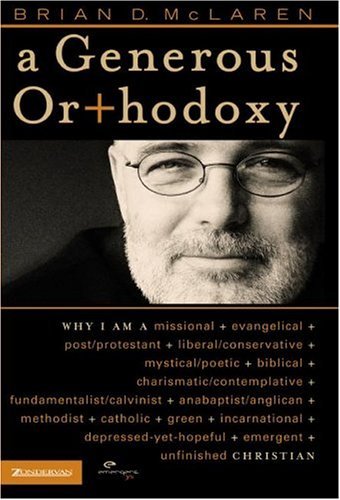Ok, here are nuggets gleaned from Wiki......
Many of the books that McLaren has written, including the "A New Kind of Christian" trilogy, deal with Christianity in the context of the cultural shift towards postmodernism. McLaren believes this theology enables him to approach faith from what he considers a more Jewish perspective which allows faith to exist without objective, propositional truth to believe.
(don't really understand this part)
He has also challenged traditional evangelicals' emphasis on individual salvation, end-times theology and the prosperity gospel.[17][18] He also creates an antithesis between personal trust in God and belief in his propositions:
(I would agree with the idea of challenging some on "end-times" theology and the prosperity gospel)
"I believe people are saved not by objective truth, but by Jesus. Their faith isn’t in their knowledge, but in God." – Brian McLaren[19]
(Ok, I like that statement)
Applying this epistemology to his theology, McLaren suggests on pp. 80–81 of More Ready Than You Realize that new Christian converts should remain within their specific contexts.
(If he "means" for those who convert to christianity to remain a voice in their community and culture....I like that, but I suspect his meaning is something else as indicated by the next passage... and that is "too much" for me.
I don’t believe making disciples must equal making adherents to the Christian religion. It may be advisable in many (not all!) circumstances to help people become followers of Jesus and remain within their Buddhist, Hindu or Jewish contexts … rather than resolving the paradox via pronouncements on the eternal destiny of people more convinced by or loyal to other religions than ours, we simply move on … To help Buddhists, Muslims, Christians, and everyone else experience life to the full in the way of Jesus (while learning it better myself), I would gladly become one of them (whoever they are), to whatever degree I can, to embrace them, to join them, to enter into their world without judgment but with saving love as mine has been entered by the Lord (A Generous Orthodoxy, 260, 262, 264).
Often McLaren's postmodern approach to hermeneutics and Biblical understanding prompts him to take a less traditional approach towards issues considered controversial by fundamentalists, such as homosexuality. McLaren encourages what he calls a humble approach to controversial issues to enable dialog with others in a productive way.[20]
( I like the approach of humility)
"Even if we are convinced that all homosexual behavior is always sinful, we still want to treat gay and lesbian people with more dignity, gentleness, and respect than our colleagues do. If we think that there may actually be a legitimate context for some homosexual relationships, we know that the biblical arguments are nuanced and multilayered, and the pastoral ramifications are staggeringly complex. We aren't sure if or where lines are to be drawn, nor do we know how to enforce with fairness whatever lines are drawn."[21]
(I am confident where lines are drawn regarding human sexuality, sounds like he may not be. I do agree though with his aspect of dignity and gentleness toward those who may struggle with such issues and temptations)
In January 2006, McLaren expressed uncertainty about what the Christian view on homosexuality should be. He suggested a five-year moratorium on the issue.[22]
(I personally see no ambiguity or thus a need for a moratorium on the issue)
McLaren favors what he calls a "generous" approach to biblical hermeneutics, claiming that the foundational and objective hermeneutics of Evangelicals leads them to political conservatism. McLaren has been an outspoken advocate of issues such as social justice and peace.
(Nothing wrong with "social justice" and or peace, however it is hijacked by the political left, as are many things that we religious and political conservatives should be willing to stand for.)
Though McLaren is opposed to what he asserts are oppressive, Evangelical, literalist hermeneutics, his own hermeneutic is often called into question by conservative Christians.[23] Often McLaren's own view on interpreting the Bible seems to call for others to rethink the whole process of interpretation.[24][25] In his book, A New Kind of Christian, McLaren writes (via his main character Neo),
"Our interpretations reveal less about God or the Bible than they do about ourselves. They reveal what we want to defend, what we want to attack, what we want to ignore, what we're unwilling to question..." (A New Kind of Christian, 50)
(I rather like this statement, reminds me of a statement in George Bush's book Decision Points where he said:
If one never has questions or doubts about their faith, then they have not spent much time or effort in the pursuit and investigation of their faith.
In 2011 McLaren defended Rob Bell's controversial book Love Wins against critiques from figures such as Albert Mohler, who argued that Bell advocated universalism.[26][27] Like Bell, McLaren has been branded a universalist by some of his critics, a charge which McLaren denies. Instead he argues for what he calls a more humble, inclusivist approach to the issue.[28]
I read Bell's book, would not find myself on the same side of the equation as Bell. It was a book a questions....lots of questions.
McLaren has also questioned the penal substitution interpretation of the atonement and the importance some conservatives place on the doctrine.[2
Don't have enough knowledge about theological theories on atonement to comment.

